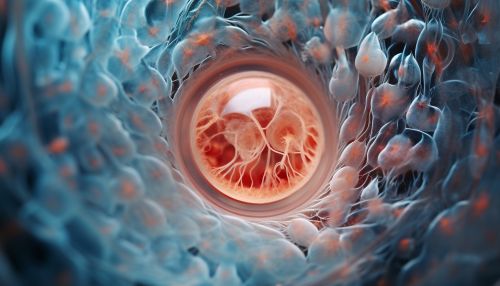Embryo
Overview
An embryo is an early stage of development of a multicellular organism. In general, in organisms that reproduce sexually, an embryo develops from a zygote, the single cell resulting from the fertilization of the female egg cell by the male sperm cell. The zygote possesses half the DNA of each of its two parents. In plants, animals, and some protists, the zygote will begin to divide by mitosis to produce a multicellular organism. The result of this process is an embryo.


Embryonic Development in Animals
In animals, the development of the embryo proceeds through specific recognizable stages of blastula, gastrula, and organogenesis. The blastula stage typically features a fluid-filled cavity, the blastocoel, surrounded by a sphere or sheet of cells, also called blastomeres. During gastrulation the embryo undergoes dramatic rearrangement to form the three germ layers: ectoderm, endoderm, and mesoderm. Organogenesis then proceeds to form the organs from these germ layers.
Embryonic Development in Humans
In humans, the term 'embryo' applies to the period of gestation from the third through the eighth week post-fertilization. During this time, the basic structures of the body are formed. This process begins shortly after fertilization, with the zygote dividing into two cells, then four cells, and so on. Each of these cells is a totipotent stem cell, meaning it can divide into any type of cell in the body.
Embryonic Development in Plants
In plants, the embryo is part of the seed, along with the plant endosperm and the seed coat. The plant embryo has three parts: the radicle, the hypocotyl, and the cotyledons. The radicle is the embryonic root. The hypocotyl is the embryonic shoot, which develops into the stem and leaves. The cotyledons are the embryonic leaves which become the first leaves of the plant upon germination.
Embryonic Stem Cells
Embryonic stem cells (ESCs) are pluripotent stem cells derived from the inner cell mass of a blastocyst, an early-stage pre-implantation embryo. Human embryos reach the blastocyst stage 4–5 days post fertilization, at which time they consist of 50–150 cells. ESCs are characterized by their ability to differentiate into any cell type and by their ability to propagate.
Ethical Considerations
The use of human embryos for research on embryonic stem (ES) cells is currently a topic of much debate. While the potential use of ES cells for therapeutic purposes is widely recognized, as they could potentially be used to treat a wide range of diseases, the fact that the extraction of ES cells involves the destruction of the embryo leads to ethical issues.
